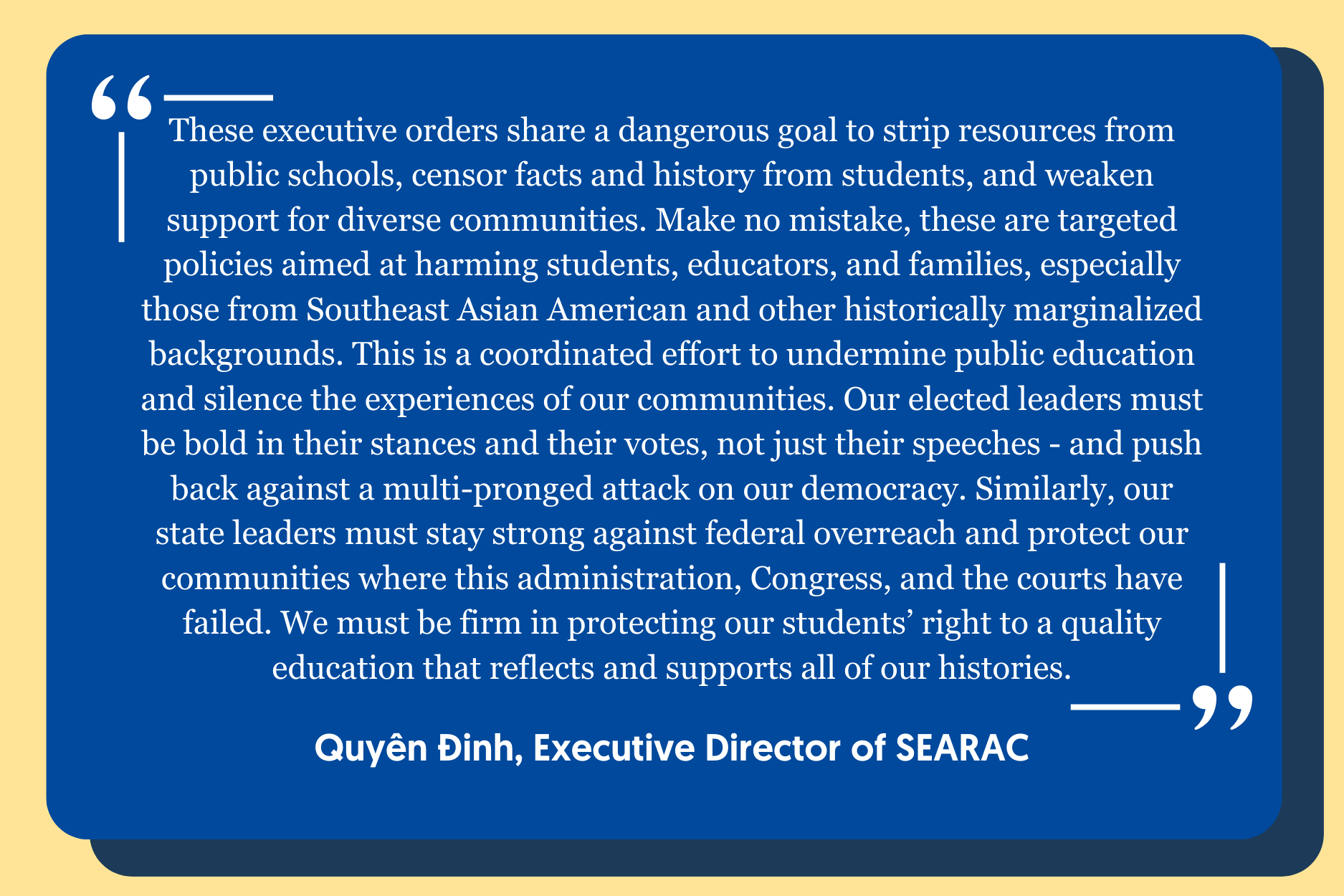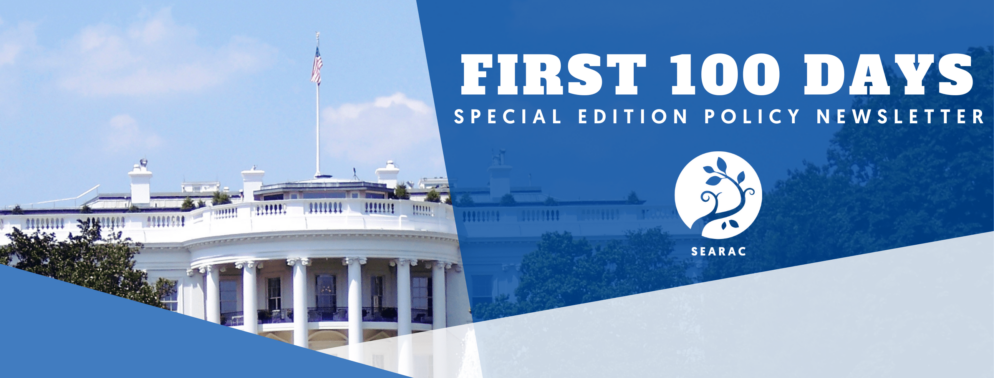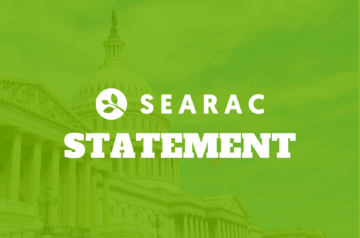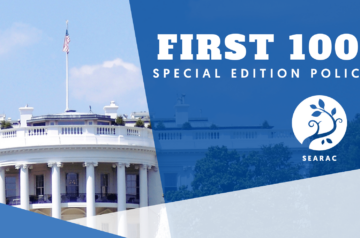EXECUTIVE ORDERS AND AGENCY POLICIES
The new administration continued its strategy of overreach, illegality, chaos, and fear-mongering by issuing more harmful executive orders (EOs). EOs are written orders by the president that do not require approval by Congress.
Many of the administration’s recent EOs and policies weaken public education by creating unsupportive school environments.
Read our analysis of key EOs and policies we are monitoring below:
EOs and agency policies targeting diversity, equity, inclusion, and access in education
What do these EOs do:
Deny critical funding to schools for teaching about the complex history of the United States, which includes histories of racism and gender discrimination
What does this mean: The administration is attempting to control what students learn in school. However, there are laws against the federal government interfering with what is taught to students, as long as these curricula decisions don’t create hostile learning environments or violate civil rights laws. This EO prevents marginalized students from learning about themselves and their communities.
Who will this primarily impact: Students, families, and educators. Every student should be treated with respect and get the chance to see themselves and their communities reflected in what’s taught to them in schools.
Threaten to withdraw federal funds from schools in K-12 and higher education that support access and inclusion for diverse students
What does this mean: A US Department of Education (ED) memo released Feb 14 falsely claims that such programs – which increase access to education for students who have historically had less access, like SEAAs – are discriminatory and prohibited under civil rights law. This is a misrepresentation of both discrimination and civil rights law in order to control who gets to benefit from education and what schools and educators teach their students. The ED memo states that it will take “appropriate measures” to “assess compliance” within 14 days of the policy’s issue date; there is no information on what specific federal funds are included or other details.

Take away essential funding for public schools to boost private and religious education
What does this mean: The administration wants to subsidize wealthy families’ tuition for private and religious schools at the expense of already underresourced public schools, which serve all students, no matter their learning needs, beliefs, or family income.
Who does this primarily impact: Don’t be fooled by the language about “choice.” Voucher programs steal money intended for public schools to give it to private schools that aren’t held accountable for actually serving students and frequently discriminate by race, gender, sexual orientation, or disability. Also, vouchers rarely cover the full price of tuition, so often they act as subsidies for wealthy families that were already going to enroll their children in private schools. Vouchers don’t give “choice” to most families, and they leave public schools with even less funding to fulfill their mission to educate all students.
Other harmful EOs
What do these EOs do:
Remove critical federal data
What does this mean: The administration has used the EOs as justification to remove important federal data, such as census data. The administration is specifically claiming to remove certain information on gender or racial diversity, but the removals have impacted federal government datasets and webpages containing information on health treatments and outcomes, educational surveys, race and ethnicity, and sexual orientation and gender identity. Additionally, while some of the web sources that were pulled down have since been restored, it’s unclear what was arbitrarily removed or changed.
Who will this primarily impact: LGBTQIA+ communities as well as countless communities, state and local governments, and providers of essential services like doctors and educators who rely on consistent and reliable government data.
Abandon America’s international responsibilities
What does this mean: An EO from the first day of the Trump Administration had paused funds for international assistance for at least 90 days. This included the US State Department’s global mine-clearing programs in Cambodia, Laos, and Vietnam.
Who will this primarily impact: The funding pause and stop-work order endanger people in Southeast Asia and other areas across the globe that remain affected by unexploded and uncleared landmines — many of which were dropped by the United States and its allies during aerial bombing campaigns during the Vietnam War. Laos is the most heavily bombed country per capita in the world, and about a third of the country is contaminated with unexploded ordnance.
CONGRESSIONAL ACTIONS
Agent Raul Gonzalez Officer Safety Act (HR 35): Passed the House on Feb 13
What does this do: Like the Laken Riley Act, this bill manipulates a tragedy to punish immigrants of color. Named after a Border Patrol Agent who tragically lost his life after a high speed chase, the bill would add harsh criminal legal system and immigration penalties for an individual who is driving in a vehicle pursuit within 100 miles of the border.
Who will this primarily impact: The language is vague, and the added penalties could be broadly applied, especially in communities that already experience disproportionate enforcement and racial profiling. Also, Border Patrol regularly engages in high speed chases when safer options for pursuit are available, endangering communities and public safety. This bill further criminalizes immigrants by adding broad criteria for deportability and does not truly address the dangers posed by cruel enforcement practices.
No Bailout for Sanctuary Cities Act (HR 32): Expected for a House vote soon
What does this do: This bill would strip states and localities across the country of billions of dollars in federal funding for essential services that safeguard the health and safety of all residents. This isn’t just an assault on immigrants; it’s a direct attack on all families and communities.
What does this mean: This bill would force cities to choose between abandoning policies that protect their communities, including immigrants, or losing federal funding for a vast array of essential programs.
Who will this primarily impact: If enacted, the bill could give Trump the power to cut off federal funding to communities in nearly 700 communities across 28 states and DC — putting tens of millions of American families at risk of losing vital services, from Meals on Wheels to the local bus line, to public school funding.



